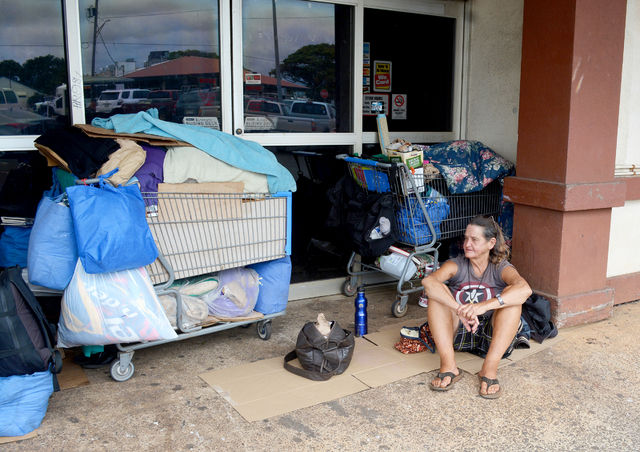LIHUE — Kauai saw a slight drop in the number of homeless people living on the island compared to last year, according to a survey released by the state Thursday. The results of the annual Point in Time (PIT) count
LIHUE — Kauai saw a slight drop in the number of homeless people living on the island compared to last year, according to a survey released by the state Thursday.
The results of the annual Point in Time (PIT) count show that Kauai’s homeless population declined by about 10 percent, in contrast to a statewide trend that saw increases on Oahu and the Neighbor Islands. Homelessness jumped by 43 percent on Hawaii Island while Maui saw an increase of 19 percent.
Gov. David Ige said the results of the survey send an unmistakable message.
“It is clear that we must collaborate with the counties to address the rising number of homeless individuals and families across the state,” Ige said.
The governor added that he supports programs that provide emergency and transitional housing, job training, and services for the mentally ill and those struggling with addiction.
The PIT count found 339 homeless people living on Kauai as of January 2015, down from 378 last year. State officials stressed that the survey is not meant to provide an exact count. Instead, it should be looked at as a snapshot in time, meant to provide a baseline number to measure and track the scale of Hawaii’s homelessness problem.
But despite the seemingly positive news for the island, some say the survey results do not match reality.
Stephanie Fernandes is the homeless and housing director for Kauai Economic Opportunity, Inc. (KEO), which runs the Mana Olana shelter on Wehe Road in Lihue. She said that her organization has actually seen a small increase in the number of homeless.
The PIT count “doesn’t include the people who are hidden homeless,” Fernandes said. “Many people do not want to be counted.”
The Mana Olana shelter is the only emergency homeless shelter on the island, and it can only hold up to 19 people per night.
“There are people being turned away,” Fernandes said.
Fernandes estimates the true number of homeless on Kauai to be in the 500 to 600 range, almost double those found in the survey.
Hawaii Department of Human Services spokesperson Kayla Rosenfeld said the count is just one of several tools the state uses to get a handle on the situation.
“Right now it’s a useful tool to get an idea of the number of people that are sheltered and unsheltered,” Rosenfeld said. “With that data, there is an opportunity to make informed policy decisions.”
She added that the PIT count is combined with other data to help determine policies related to homelessness and funding.
Malissa Walker, manager of the Vim and Vigor health food store in downtown Lihue, said she hasn’t noticed a decline in the number of homeless either: “I see a lot of revolving groups. There are people I will see every day, and then after a few months it will be a new group of people.”
One of those people she sees is Michael Parisi, 37, who survives off of Supplemental Security Income because he has a mental disability.
Parisi came to Kauai more than two years ago from New York, and said that he has noticed fewer homeless people on Kauai lately.
“That’s due to the fact there are less little hideout spots, places to put your things,” Parisi said.
Despite his current situation, Parisi said that he is willing to work, and Walker believes he would be able to if given some guidance.
On Kauai, only 26 percent of all homeless people (individuals and families) are sheltered in emergency or transitional housing, with the rest unsheltered. But more than half of homeless families are sheltered.
A 65-year-old homeless man who did not want to give his name said that he has a good opinion of the KEO shelter.
“I’ve stayed at the shelter some nights, but otherwise I just try to find a place to get out of the rain,” the man said. “Being homeless is probably easier here than it is in Michigan.”
The man said that he hasn’t been willing to accept help to get housing.
“It’s probably my own lack of motivation. That’s my own personal preference — I can’t speak for everyone who is homeless,” he said.


